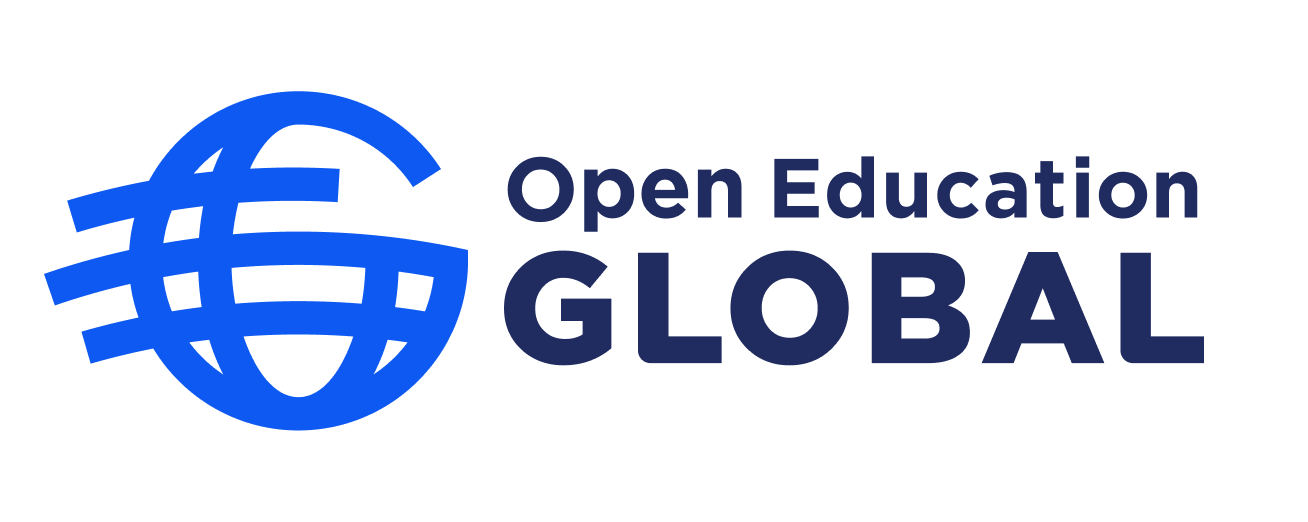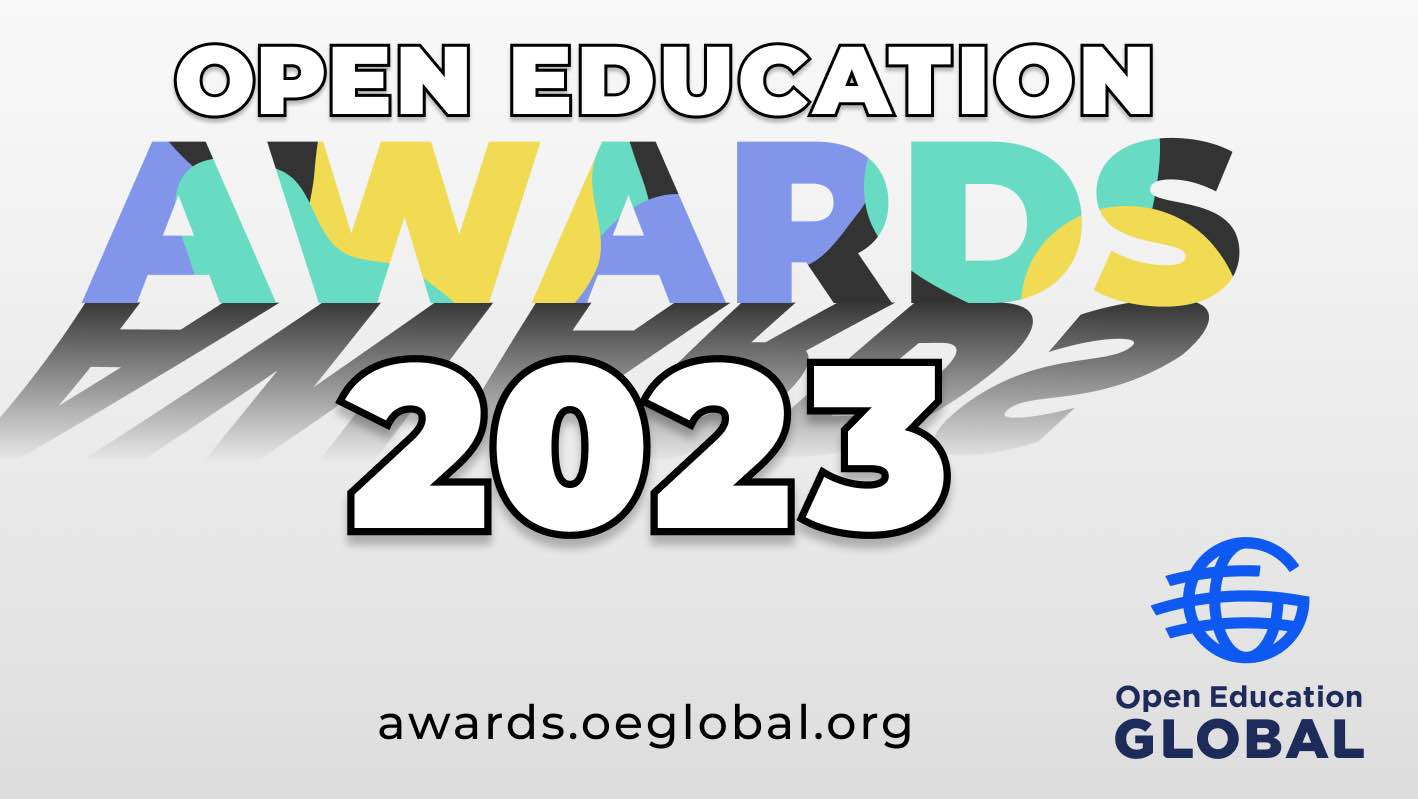Now in its 13th year, the Open Education Awards for Excellence again provides recognition for the people, resources, and practices in Open Education through a community-driven process.
From an open call for nominations that opened in May, we collected 172 nominations across the 16 award categories, representing people and projects from 38 countries. Next, our review committee, which includes 20 former award winners combined with the input of the OEGlobal Board of Directors, gets us to the current stage. It’s time to meet the finalists for the 2023 OEAwards!

In the spirit of widening the scope of recognition, like last year, we are first announcing the OEAwards shortlist of finalists highlighting the achievements of 15 individuals and 34 open education initiatives and practices that are contenders for the awards.
Take some time to scan the 2023 OEAwards Finalists organized by the award categories or as listed below. Please show your appreciation by replying to or reposting our @OEGlobal social media messages. Please use the hashtag #OEAwards23 or reply to this announcement in our OEG Connect Awards space (you access the Connect page below).
What’s next? The final award winners will be announced in an OEG Live webcast at 17:00 UTC on September 13 (check for local time). The special session for OEAwardees at the November 16-18 OEGlobal Conference in Edmonton will also be live-streamed.
And now… take in the long list of our finalists below or explore them more (with links) in the OEAwards website gallery of the 2023 Finalists.
PEOPLE IN OPEN (Individual Awards)
Catalyst Award
This award is presented to an individual actively engaged in promoting the creation and implementation of OER and application Open Practices. A Catalyst is someone other than a professor/teacher who supports the ideals of the Open Education movement through their own practices and who creates engagement in Openness within an organization or community.
- Abbey Elder
- Kathy Essmiller
- Jonathan Poritz
- Jennryn Wetzler
Educator Award
This award honors an innovative teacher/professor who has published and/or used a significant body of Open Resources and/or applied Open Practices over a sustained period (at least one year) in their teaching practice. This individual’s open course materials and professional practices have been recognized for impacting student learning and influencing peers to share more openly.
- Maha Bali
- James Brunton
Student Award
This award recognizes the outstanding endeavors of a student who has advocated for or benefitted academically from using open educational resources or open educational practices. It is presented to a student whose achievements may inspire others to pursue degree programs that utilize open resources and/or someone who played a prominent role in advocating successfully for the promotion and advancement of open education.
- Henry Agnew, Ethan Turner, and Matthew Barkovich
- Yasser Tamer Atef
Leadership Award
This award is presented to an individual who has demonstrated significant leadership and longstanding involvement with Open Education. This person has made significant and clear contributions to the furtherance of the Open Education movement, with contributions to Open Education that have spanned regions and/or had a global impact.
- Catherine Cronin
- Patrina Law
- Lisa Petrides
- Martin Weller
WHAT WE SHARE (Open Asset Awards)
Open Curation / Repository Award
This award is given to an exceptional collection of high-quality open materials made available via a process of curation or review. More than merely collecting content on a specific subject, strong curation involves carefully selecting content. evaluating it for specific purposes, and making it available in a meaningful way that can then be customized and re-shared for other people..
- Mada ICT-AID Competency Framework Aligned OER Hub
- Proyecto EDIA
- Storyweaver
- VCCS Transfer Course Mapping Hub
Open Infrastructure Award
This award is for implementing or developing a set of technologies that encompass open-source tools for creating open educational resources, use in an educational context, curation, improvement, and reuse, as well as sharing. The “infrastructure” is broader than open-source software; it also includes open hardware, open standards enabling interoperability, and other open technologies that are instrumental in enabling open education.
- convOERter (OER Conversion Tool)
- Openverse
Open Reuse / Remix / Adaptation Award
This award is given to an exceptional collection of high-quality open materials made available via a process of curation or review. More than merely collecting content on a specific subject, robust curation involves carefully selecting content. evaluating it for specific purposes, and making it available in a meaningful way that can then be customized and re-shared for other people.
- 《少年的自我療傷—甘耀明《殺鬼》少年圖書改編》客家語多媒體教材(“Multimedia Open Textbook for Self-Healing of a Teenager: a Picture Book Adapted from Ghost Slayer by Gan Yaoming” )
- Français inclusif
- HUM 1: Modern Humanities on Manifold
- LIDA103fr (Learning in a digital age 103fr: Open education, copyright and open licensing in a digital world)
Significant Impact OER Award
This award recognizes high-quality, innovative teaching and learning materials openly shared that have significantly impacted accessibility, distribution, remix, learning, or social change. These include but are not limited to Open Courses, Open Textbooks, Videos / Simulations / Animations, Audio / Audiobook, etc.
- American Government Audiobook
- Futurum Careers’ educational resources
- Universal Design for Learning (UDL) for Inclusion, Diversity, Equity, and Accessibility (IDEA)
- Understanding Homelessness in Canada: From the Street to the Classroom
HOW WE SHARE (Open Practice Awards)
Open Collaboration Award
This award goes to an environment that fosters the collective production of open resources and open practices with a shared goal. Such places allow for an interchange of ideas supported through technologically mediated collaborative platforms, encourage new opportunities for people to form ties with others and create things together, and expand diverse goals, backgrounds, and cultures.
- Exercise and Physical Activity in Indigenous Health
- The National Teaching Repository
- Regional Leaders of Open Education Network (RLOE)
- STEAM OER LATAM Community
Open Pedagogy Award
This award highlights innovative open teaching practices that incorporate openness in multiple levels of the learning process. Open Pedagogy engages in the production, use, and reuse of content and demonstrates effective open teaching practices and ways of educating that increase access to learning and address equity and fairness.
- Buds, Branches and Bark: A Guide to Winter Identification in the Pacific Northwest
- Open for Inclusive Excellence
- Open for Antiracism Program
- Competendo Digital Toolbox
Open Policy Award
This award goes to an environment that fosters the collective production of open resources and open practices with a shared goal. Such places allow for an interchange of ideas supported through technologically mediated collaborative platforms, encourage new opportunities for people to form ties with others and create things together, and expand diverse goals, backgrounds, and cultures.
- Washington OER and Low-Cost Labeling Policies
Open Research Award
This award recognizes research studies or initiatives about open education and/or related areas that help advance our understanding of and demonstrate effectiveness related to the challenges of the Open Education movement. Recognized efforts apply attributes of Openness in the research and dissemination processes.
- Annual Top 10 “Good Reads” in Open Access Journals in Digital Education
- OpenResearchLab
- Special Issue of the Journal for Multicultural Education
SPECIAL AWARDS (Open Practice Awards)
Diversity, Equity & Inclusion Award
This award recognizes creativity, innovation, and the creation of opportunities that promote a welcoming and supportive diverse environment and facilitate inclusion and/or access. Examples are ones that develop cultural awareness and foster intercultural communication and collaboration.
- A People’s History of Structural Racism in Academia: From A(dministration of Justice) to Z(oology)
- Enhancing Inclusion, Diversity, Equity and Accessibility (IDEA) in Open Educational Resources (OER)
- GO-GN EDI Guidelines: Equity, Diversity, and Inclusion in Open Education with a focus on Africa and Latin America
- Maamwi Hub
Open Resilience Award
This award honors practices that have found the best ways of overcoming adversity in the face of unprecedented challenges or crises. Activities that clearly demonstrate the implementation of open educational resources or open educational practices to address challenges arising in any crisis.
- Academic Development Open Virtual Hub (ADOVH)
- Responsive OER for Ukrainians
Wildcard Award
Awards ought to be open themselves! This new award is open to recognizing something or someone not entirely covered by any other category. Create your own award criteria, and help recognize everything possible in open education.
- “Is this an OER?” Addressing the Complex Relationship between Open and Affordable Course Materials
- “We Like Sharing” Open Photo Competition
Once again, winners will be announced in an OEG Live webcast on September 13. Save the date!
Learn about the finalists in more detail…
Share Your Comments in OEG Connect
What do you think of the shortlisted finalists? Add to the discussions below and share your experiences of these people and platforms.


Did you feel the ripples yet? Yes, we have just published here the finalists for the 2023 OEAwards! They are just listed by name below, but please explore the Finalists Gallery to learn more about each person and project
Now it’s time for you to cheer, congratulate, and also explore perhaps ones that are new to you.
Is it possible for some of these to be decided live by rap battle? I would enjoy seeing Martin Weller and Catherine Cronin go toe to toe in that format.
Ditto Terry’s point, but for my own sake I’d like to pitch a kara-OER-ke battle instead!
And I’d only add a yOERga request to this list of battles. Congrats to all the finalists!!!
oh this is better yes!